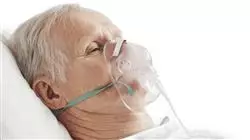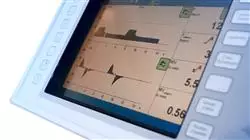University certificate
Accreditation/Membership

The world's largest faculty of nursing”
Introduction to the Program
Thanks to this degree, you will learn the state-of-the-art procedures to create an individualized care plan for patients with COPD or heart failure undergoing NIMV"

In recent years, clinical studies have shown that Non-Invasive Mechanical Ventilation has innumerable benefits for people with a wide range of respiratory difficulties. Consequently, its use is becoming more and more common in hospital settings, leading to the improvement of procedures and nursing care before, during and after the application of NIMV, in order to improve the patient's quality of life. For this reason, nurses who wish to carry out an updated healthcare practice should be aware of these advances in order to optimize their professional update.
For this reason, TECH Global University has designed this program, which provides students with the most cutting-edge knowledge on Non-Invasive Mechanical Ventilation for Nursing in only 1,500 hours. Throughout this academic period, students will delve into strategies to optimize the choice of the most appropriate interface for each patient or learn the techniques to prevent the appearance of pressure ulcers caused by NIMV. Likewise, students will learn about the latest methods for monitoring the patient undergoing Non-Invasive Mechanical Ventilation.
Since this Professional master’s degree is taught in a 100% online mode, students will not be forced to give up their professional and personal obligations to complete their updating process. Likewise, this degree has been designed by physicians and nurses of reference in the field of Non-Invasive Mechanical Ventilation and the care of patients with respiratory difficulties. Therefore, the knowledge that the student will assimilate will be fully useful in daily practice.
Learn in depth, with this program, the updated techniques to prevent the appearance of pressure ulcers caused by NIVM"
This Professional master’s degree in Non-Invasive Mechanical Ventilation for Nursing contains the most complete and up-to-date scientific program on the market. The most important features include:
- The development of case studies presented by VMNI experts
- The graphic, schematic, and practical contents with which they are created, provide scientific and practical information on the disciplines that are essential for professional practice
- Practical exercises where the self-assessment process can be carried out to improve learning
- Its special emphasis on innovative methodologies
- Theoretical lessons, questions to the expert, debate forums on controversial topics, and individual reflection assignments
- Content that is accessible from any fixed or portable device with an Internet connection
Complete your update as a nurse 100% online and without leaving your home”
The program’s teaching staff includes professionals from the sector who contribute their work experience to this program, as well as renowned specialists from leading societies and prestigious universities.
The multimedia content, developed with the latest educational technology, will provide the professional with situated and contextual learning, i.e., a simulated environment that will provide immersive education programmed to learn in real situations.
This program is designed around Problem-Based Learning, whereby the professional must try to solve the different professional practice situations that arise during the academic year For this purpose, the students will be assisted by an innovative interactive video system created by renowned and experienced experts.
Identify state-of-the-art Non-Invasive Mechanical Ventilation patient monitoring techniques"

Get the best didactic content in the educational environment and enjoy studying through revolutionary multimedia formats"
Why study at TECH?
TECH is the world’s largest online university. With an impressive catalog of more than 14,000 university programs available in 11 languages, it is positioned as a leader in employability, with a 99% job placement rate. In addition, it relies on an enormous faculty of more than 6,000 professors of the highest international renown.

Study at the world's largest online university and guarantee your professional success. The future starts at TECH”
The world’s best online university according to FORBES
The prestigious Forbes magazine, specialized in business and finance, has highlighted TECH as “the world's best online university” This is what they have recently stated in an article in their digital edition in which they echo the success story of this institution, “thanks to the academic offer it provides, the selection of its teaching staff, and an innovative learning method aimed at educating the professionals of the future”
A revolutionary study method, a cutting-edge faculty and a practical focus: the key to TECH's success.
The most complete study plans on the university scene
TECH offers the most complete study plans on the university scene, with syllabuses that cover fundamental concepts and, at the same time, the main scientific advances in their specific scientific areas. In addition, these programs are continuously being updated to guarantee students the academic vanguard and the most in-demand professional skills. In this way, the university's qualifications provide its graduates with a significant advantage to propel their careers to success.
TECH offers the most comprehensive and intensive study plans on the current university scene.
A world-class teaching staff
TECH's teaching staff is made up of more than 6,000 professors with the highest international recognition. Professors, researchers and top executives of multinational companies, including Isaiah Covington, performance coach of the Boston Celtics; Magda Romanska, principal investigator at Harvard MetaLAB; Ignacio Wistumba, chairman of the department of translational molecular pathology at MD Anderson Cancer Center; and D.W. Pine, creative director of TIME magazine, among others.
Internationally renowned experts, specialized in different branches of Health, Technology, Communication and Business, form part of the TECH faculty.
A unique learning method
TECH is the first university to use Relearning in all its programs. It is the best online learning methodology, accredited with international teaching quality certifications, provided by prestigious educational agencies. In addition, this disruptive educational model is complemented with the “Case Method”, thereby setting up a unique online teaching strategy. Innovative teaching resources are also implemented, including detailed videos, infographics and interactive summaries.
TECH combines Relearning and the Case Method in all its university programs to guarantee excellent theoretical and practical learning, studying whenever and wherever you want.
The world's largest online university
TECH is the world’s largest online university. We are the largest educational institution, with the best and widest online educational catalog, one hundred percent online and covering the vast majority of areas of knowledge. We offer a large selection of our own degrees and accredited online undergraduate and postgraduate degrees. In total, more than 14,000 university degrees, in eleven different languages, make us the largest educational largest in the world.
TECH has the world's most extensive catalog of academic and official programs, available in more than 11 languages.
Google Premier Partner
The American technology giant has awarded TECH the Google Google Premier Partner badge. This award, which is only available to 3% of the world's companies, highlights the efficient, flexible and tailored experience that this university provides to students. The recognition as a Google Premier Partner not only accredits the maximum rigor, performance and investment in TECH's digital infrastructures, but also places this university as one of the world's leading technology companies.
Google has positioned TECH in the top 3% of the world's most important technology companies by awarding it its Google Premier Partner badge.
The official online university of the NBA
TECH is the official online university of the NBA. Thanks to our agreement with the biggest league in basketball, we offer our students exclusive university programs, as well as a wide variety of educational resources focused on the business of the league and other areas of the sports industry. Each program is made up of a uniquely designed syllabus and features exceptional guest hosts: professionals with a distinguished sports background who will offer their expertise on the most relevant topics.
TECH has been selected by the NBA, the world's top basketball league, as its official online university.
The top-rated university by its students
Students have positioned TECH as the world's top-rated university on the main review websites, with a highest rating of 4.9 out of 5, obtained from more than 1,000 reviews. These results consolidate TECH as the benchmark university institution at an international level, reflecting the excellence and positive impact of its educational model.” reflecting the excellence and positive impact of its educational model.”
TECH is the world’s top-rated university by its students.
Leaders in employability
TECH has managed to become the leading university in employability. 99% of its students obtain jobs in the academic field they have studied, within one year of completing any of the university's programs. A similar number achieve immediate career enhancement. All this thanks to a study methodology that bases its effectiveness on the acquisition of practical skills, which are absolutely necessary for professional development.
99% of TECH graduates find a job within a year of completing their studies.
Professional Master's Degree in Noninvasive Mechanical Ventilation for Nursing
Discover the exciting field of noninvasive mechanical ventilation and expand your knowledge in respiratory patient care with the Professional Master's Degree in Noninvasive Mechanical Ventilation for Nursing from TECH Global University. This high-level online program gives you the opportunity to specialize in this innovative technique from the comfort of your home or office. In the Professional Master's Degree in Noninvasive Mechanical Ventilation for Nursing, you'll learn about the different modes of ventilation, proper selection of interfaces and equipment, patient monitoring and troubleshooting common problems. You'll also explore the latest research and advances in this area, keeping you up to date with best practices and the latest technologies.
Enroll now and advance professionally
At TECH Global University we understand the importance of noninvasive mechanical ventilation in the treatment of patients with acute or chronic respiratory failure. With our Professional Master's Degree, we will provide you with the necessary knowledge to understand the theoretical and practical foundations of this technique, as well as the clinical skills to apply it safely and effectively. The online modality offers you numerous benefits. You will be able to access the Professional Master's Degree contents from anywhere and at any time, adapting it to your pace of life and schedule. In addition, you will have the support of a highly qualified teaching team that will guide you throughout the program, answering your questions and providing you with feedback. By studying online, you will be able to combine your learning with your professional and personal responsibilities. You will not have to give up your job or move to a physical location, saving time and travel costs. In addition, you will be able to interact with other healthcare professionals in an online environment, sharing experiences and enriching your learning. Become an expert in noninvasive mechanical ventilation and excel in your career as a nursing professional. Enroll in the Professional Master's Degree in Noninvasive Mechanical Ventilation for Nursing from TECH Global University and acquire the knowledge and skills necessary to provide optimal care to respiratory patients.







